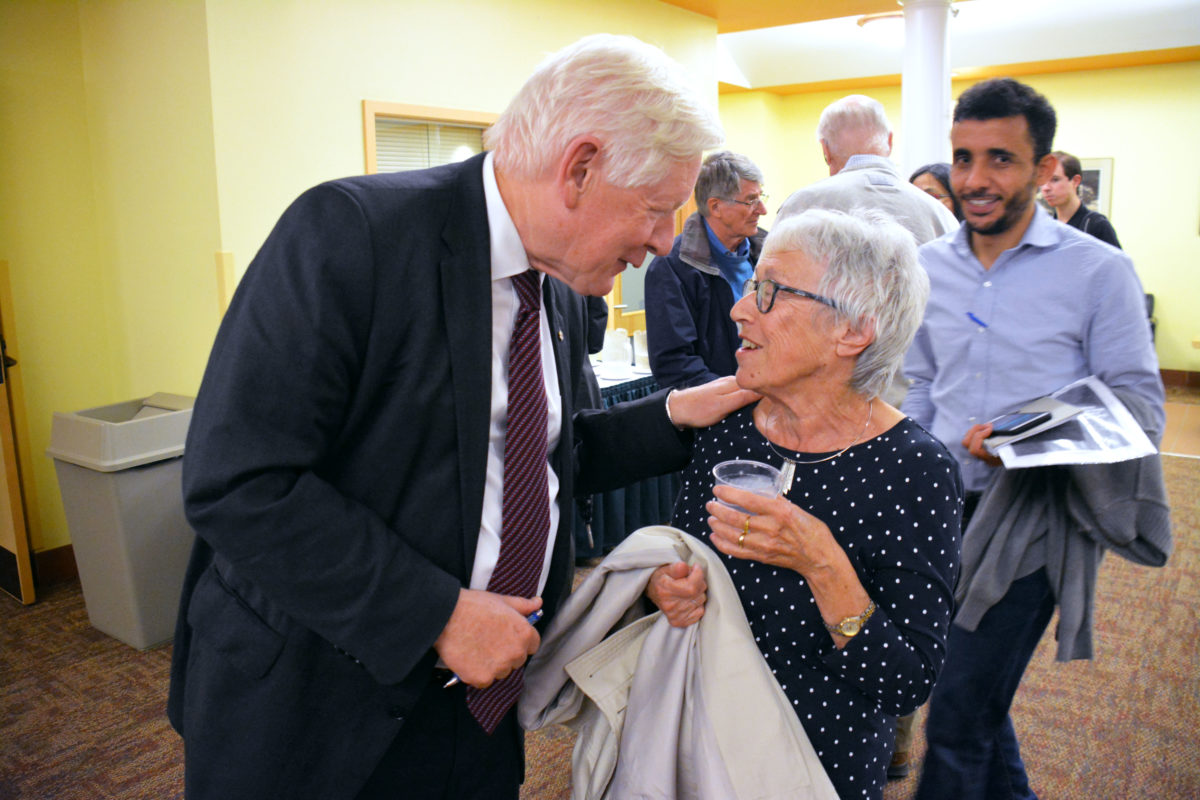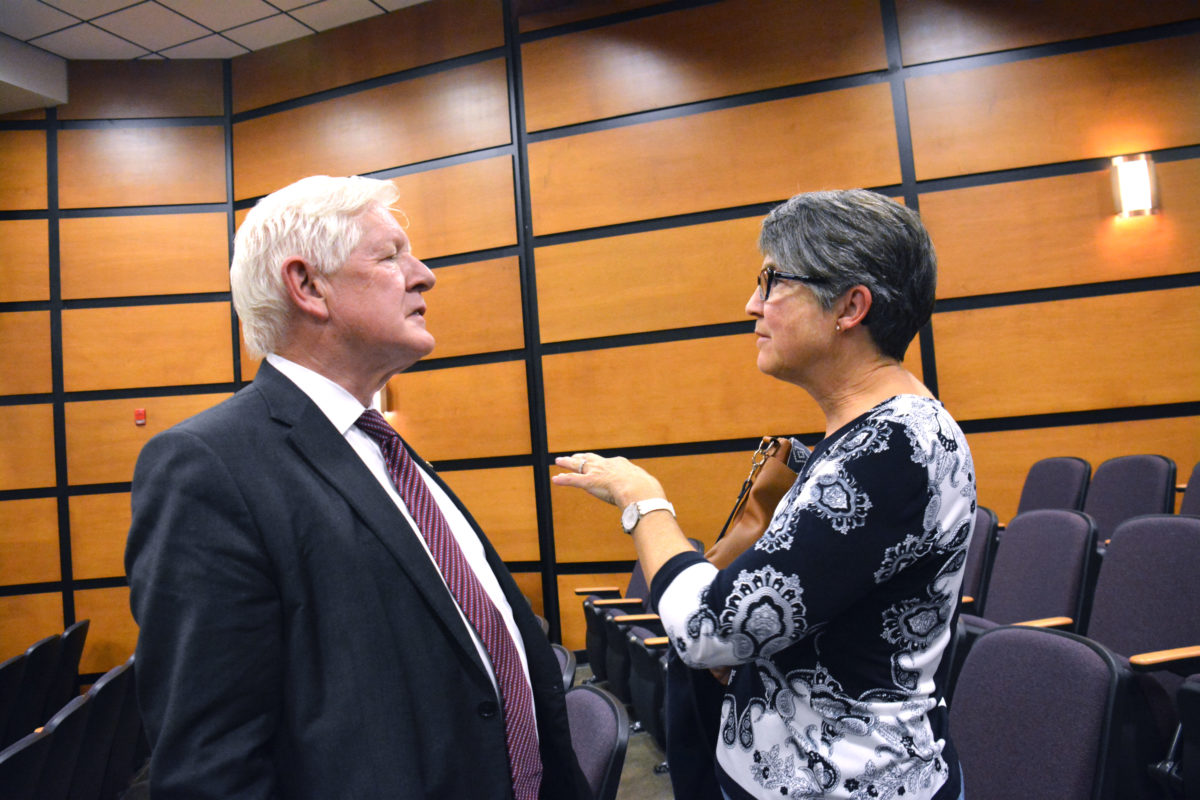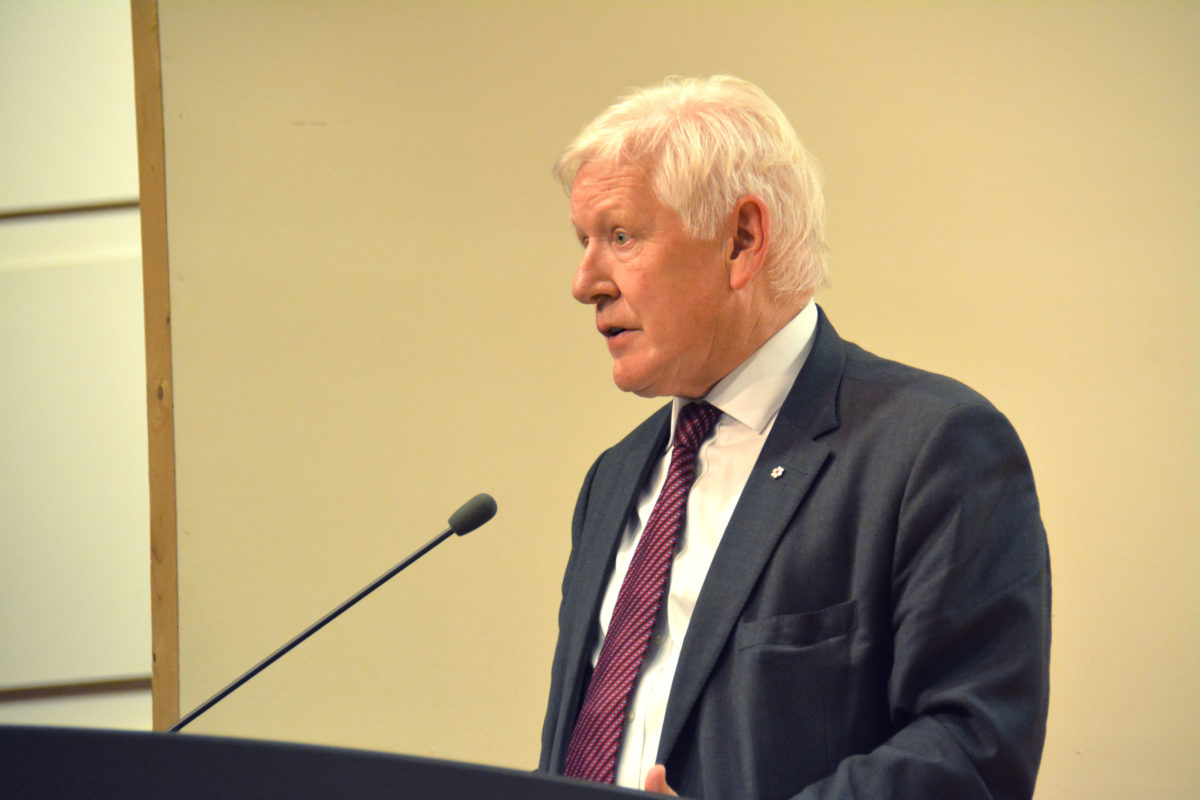When Bob Rae was leaving Myanmar after a humanitarian envoy in February of 2018, he spoke with a man of the stateless Rohingya people. He asked the man what he should tell everyone when he got back to Canada.
“He said, ‘Tell them we’re human, we’re not dogs, we’re not rats. We’re not inferior, we’re not less. We may not have citizenship, but we are human.’”
“And I think that’s where we have to recall that when we talk about rights, we’re talking about the rights that stem from our shared humanity.”
Bob Rae is a Canadian politician, lawyer, mediator and writer. He visited St. Thomas University on Sept. 26 to deliver the annual Vigod Memorial Lecture in Human Rights.
Born in Ottawa, Rae has been involved in politics for most of his life. From 1990 to 1995, Rae was the first and only New Democratic Premier of Ontario. In 2011, he became the interim leader of the Liberal Party of Canada, before being succeeded by Justin Trudeau in 2013.
After retiring from politics in 2013, Rae began focusing his work on human rights in Canada and the world.

To an audience of approximately 350, Rae spoke of human rights in the age of populism, referencing the Rohingya crisis in Myanmar and the history of genocide against Indigenous peoples in Canada.
“Somebody asked me the other day, he said, ‘You’re doing work on Aboriginal issues in Canada and you’re doing work on the Rohingya issues in Myanmar, how do you connect these two very different things?’” Rae said.
“It all has to do with the questions of where do our rights come from? Why do we value them so much? And what is it in democracy itself that sometimes poses a threat to those rights?”
Rae addressed these questions, explaining that populism can sometimes get in the way of human rights. He defines populism as a democratic process established by the rule of the people.
“We need to understand that the will of the people can do terrible things to minorities and that there is such a thing as tyranny of the majority, which is why when we talk about protecting human rights, we need to understand that sometimes that lies in tension with democracy itself,” he said.


‘There were people living here’
Rae said that when Britain and France arrived in the Americas, the land was not empty, and they drove out the Indigenous people from the land.
“In Canada, this battle between two empires was not played out on an empty terrain. There were people living here,” he said.
“The land was unknown and undiscovered by the European communities of the time, but it was not undiscovered by the millions of people who lived in the Americas.”
Rae said people often seek out minorities or an “other” when problems arise, eradicating their human rights in the process.
“The other can be women, the other can be immigrants, the other can be the Jews, the other can be the blacks, the other can be the Indigenous people,” he said. “We can find scapegoats and find reasons why things ain’t what they used to be.”
‘You’re not from here’
In 1948, the majority of Burmese people in Myanmar began pushing a nationalist movement that has continued to strip smaller ethnic groups in the country of their rights.
“It was an expression of nationalist populism that was about protecting Buddhism, protecting the way of life, protecting a language and making sure it had predominance and power,” Rae said.
Rae said the Rohingya people in Myanmar “are at the very bottom of the social scale,” because they are Muslim, darker-skinned and live in the northwest corner of the country, near Bangladesh.
This is why the Burmese people do not refer to them by their actual name, Rae said. They call them Bengalis, because they live near Bengal, current day Bangladesh.
“As soon as you name somebody, you’re saying, ‘Well, you’re not from here. You’re from away.’ And therein lies the story, and therein lies the tension.”
Rae said the military government in Burma protects the majority of the Burmese people and disregards the minority of other ethnic groups, including the Rohingya.
“If you say democracy is about the rule of the majority, than anything goes.”


‘Because we are human’
Rae said that humanity started to believe in fundamental freedoms after World War Two, but the implementation didn’t last.
“We tried internationally to create an international rule of law. We signed in 1948, a genocide convention in which we agreed that never again would we allow a group to be singled out because of their race, their religion, their colour [or] their caste,” he said.
“And we said never again, but look at the history since 1948. We can’t say we’ve succeeded in implementing never again. But does that mean that we abandon the rule of law? We give up?”
Rae doesn’t want the world to give up.
“Over the years, and not just a few years, but many centuries, there’s evolved another sense of what is the rule of law. And that stems from a very different concept, that’s not simply based on the rules that are passed by whatever parliament or whatever revolutionary cabal or whatever grouping might exist,” he said.
“The rights that we have do not come from government, they do not even come from the [Canadian Charter of Rights and Freedoms]. The rights that we have come to us because we are human.”
He explained that human rights are not only a domestic struggle, but a global one, because they’re always complicated by politics.
“It’s challenging because the way in which we are trying to affect a better result, is complicated by politics, by competing power groups, and it’s made them more difficult by the fact that we simply have yet to create a way to implement, easily and readily, the very fragile legal architecture that we have created.”
Rae said the creation of an international rule of law is necessary to limit the power of the powerful.
“That’s why we have no choice as a country in my opinion, except to embrace the notion of the universality of rights.”

